Transitions Commission
Our mission: To identify innovative approaches that support vulnerable young people to successfully progress into further education and work
How to
Apply
About the
Commissioners
Organisations
We’ve Funded
Questions (FAQs)
The Transitions Commission has been established by the City & Guilds Foundation to support inspirational organisations to deliver innovative programmes that support young people at risk of falling out of education, training or employment.
In February 2025, data from the Office for National Statistics revealed that more young people than ever were not in work, educational or training at the end of 2024 than at any point in the past 11 years – almost one in every seven 16-24 year olds.
At the same time, there has been a huge increase in the number of young people reporting symptoms of poor mental health (34% in 2022 vs 24% in 2000), with the FE sector reporting an urgent need for action, as 90% of colleges noted an increase in students diagnosed with mental health conditions.
The enduring effect of Covid has been well covered, with children and young people still suffering from isolation and the legacy of restrictions on their education and social development. Teachers, practitioners and others working in secondary schools and colleges told us there are more ‘red flagged’ pupils (those requiring additional support, often disproportionately represented in vocational pathways) – and it is a deeper red than before, and more difficult to provide much needed support.
At City & Guilds we know the that skills have the power to transform lives, and through the Transitions Commission we hope to identify innovative, practical and scalable ways of helping young people and those working with them to overcome barriers into positive futures.
Drawing on the expertise of a panel of Commissioners, each of whom has substantial experience working within education, training and the youth sector, the Commission aims to identify and activate practical new solutions that support vulnerable young people to succeed and realise their aspirations.
“I am delighted the City & Guilds Foundation is launching the Transitions Commission to support vulnerable young people to successfully transition into training and employment. By supporting charities, social enterprise and training providers to develop new approaches we hope to generate learnings that are useful to the whole sector in ensuring that no one is left unable to realise their potential.”
Who can apply?
The Transitions Commission is open to applications from charities, social enterprises and training providers across the UK.
The Commission wants to solicit applications that address the unique local challenges faced by the College or charity and as such does not propose to publish priority groups. However, it is envisaged that the Commission will focus on applications that support young people facing the following potential barriers to further education:
- Experience of the care system or currently in care
- Experience of exclusion from school
- Experience of the criminal justice system
- Experience of being displaced or refugees
- Disability
- Have dependents
- Neurodivergent diagnosis or traits
- Young carers or those who have previously had caring responsibilities.
Geographical Focus
The Commission will also seek to prioritise applications from regions with higher levels of deprivation (as determined by the Indices of Multiple Deprivation) and/or high levels of economic inactivity (as identified by The Get Britain Working White paper).
“At City & Guilds, we know that skills change lives and communities. However, too often vulnerable young people fall through the gaps and are left behind. We hope this new Commission, supported by significant funding, will unearth new and impactful ways to help young people regardless of their background to succeed.”
What we’re looking for
The Transitions Commission has been set up to fund projects in the UK that address the following issues:
- Explore innovative new ways to support the mental health and wellbeing of young people as they navigate the transition into FE
- Support FE settings to pilot new approaches to help retain young people with multiple barriers within FE setting
- Evidence the impact of successful interventions and showcase best practice to support Colleges in their budget decisions now and into the future.
The Commission is seeking to support new approaches to supporting young people who otherwise are at significant risk of not progressing to FE or dropping out of FE in the first year to enter FE and succeed. In addition, Commissioners will seek applications which are:
- Achievable – can evidence a reasonable likelihood of success, are deliverable within the proposed duration of the grant and are capable of being suitably evaluated.
- High impact – have the potential for significant impact on the way vulnerable young people are supported to transition successfully into FE. Impact will be assessed both in terms of the impact on the group of young people supported, but also in terms of the learnings and insights generated.
- Collaborative – evidence a collaborative approach between schools, FE, charities, public sector agencies, local government and/or employers.
- Scalable – should offer the potential for scaling in the long-term and be applicable to the majority of the FE sector, if given the appropriate funding and support. Particular focus will be given to applications which have identified a potential route to scale, if successful.
- Evidence based – be centred on clear existing evidence of need and ideally in areas where there is a degree of existing consensus. Applications will score highly if they are also informed by academic research or the lived experience of young people in their target group.
What level of funding is available?
We have established an initial £500,000 fund and expect to support a handful of impactful projects.
How to apply
The two-stage process is designed to make it easy for you to apply.
First we ask that you submit an expression of interest (EoI). We will review your EoI and let you know if you are through to a full application. Please note that we are unable to provide detailed feedback.
Examples of questions in the Expression of Interest:
- About you – name and contact details, location
- Does your organisation meet the eligibility criteria?
- Annual turnover (as at last report and accounts)
- Does your project meet the project criteria?
- Funding request
- Project overview including number of people supported
- How did you hear about the Local Community Skills Fund?
If you are invited to the next round to fill in a full application form, we will ask you to elaborate on some of the responses in the Expression of Interest. You will be able to see your responses and refer back to your Expression of Interest on the application platform.
Examples of questions in the Application Form:
- Organisation details – name, legal status, registration
- Funding request (200 words)
- Project overview (from Expression of Interest)
- Project need (200 words)
- Project impact – table to be populated
- Delivery location
- Timeframe
- Disclaimer – confirm that you and your organisation are not under investigation by the Charity Commission, HMRC or any other relevant body or authority under UK law.
Organisations we’ve funded
The innovative programmes we’ve supported so far.
Construction Youth Trust
CYT Building Opportunities is a two-year pilot helping at-risk young people in Years 10 and 11 build confidence, skills and clear pathways into the future. Through workplace exposure, role models and one-to-one coaching, the programme supports smooth transitions into FE, apprenticeships or training. With 70% of participants expected to achieve a positive EET outcome and with the majority sustaining this for at least six months, CYT is creating lasting impact where it matters most.
Hackney Quest
New Futures HQ is a holistic employability and wellbeing programme for 14 – 25 year-olds overcoming challenges such as trauma, poverty, exclusion and poor mental health. Combining mentoring, accredited skills and practical support with culturally responsive counselling, the programme tackles barriers head-on while tracking outcomes to shape wider borough strategies. With a focus on both personal growth and opportunity, New Futures HQ aims for 60% of participants to progress in education, 40% to move into work, and 80% to report greater confidence, improved wellbeing and stronger skills for the future.
The Commissioners
Our commissioners have decades of experience helping young people across the UK.
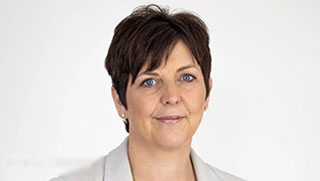
Laura Jane Rawlings MBE (Chair)
CEO of Youth Employment UK CIC
Laura-Jane is the founder and CEO of Youth Employment UK CIC. Laura-Jane was a secondary school Governor for 8 years and is now a Governor of The Bedford College Group, a founding Board Member of Youth Futures Foundation. She was awarded an MBE for services to young people in 2024.
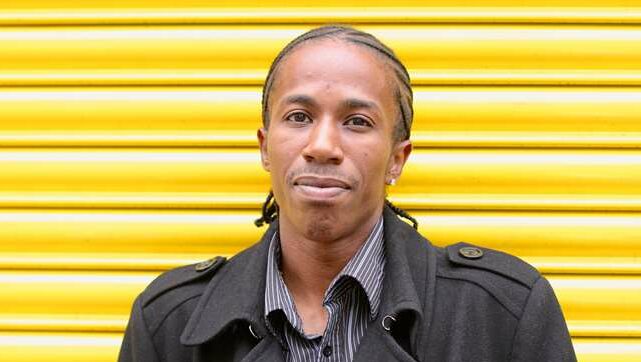
Junior Smart OBE
Founder, SOS Gangs Project
Junior founded the SOS Gangs Project, which helps transform the lives of 400 troubled young people and ex-offenders a year. Junior has won numerous awards for his work. He was a previous Commissioner for the Foundation’s Big Idea Fund and is also a Fellow of City & Guilds.
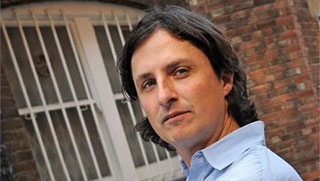
Stephen Greene CBE
Founder and CEO of Rockcorps
Stephen is Co-Founder and CEO of Rockcorps – a marketing and entertainment company which uses music and culture to inspire action amongst individuals, society and business. He was awarded CBE for services to young people in 2019 and is a City & Guilds Fellow.
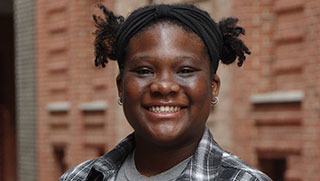
Princess Sebastiao
Member of the City & Guilds Young Learner Advisory Team
Princess is an advocate for young individuals especially from a BAME & low socio-economic backgrounds by sharing personal experiences and the experiences of others. She is a Marketing Strategist at Cisco and is a member of the City & Guilds Young Learner Advisory Team.

Chris Martin
Founder of Chris Martin Consultancy and former CEO of The Mix
Chris was CEO of The Mix (formerly YouthNet), the UK leading digital advice charity for young people. Chris now advises third sector leaders on the adoption of AI technologies. He sits on the Charity AI Taskforce with CAST, Open Youth Infrastructure Group for NPC, and is chair of Trustees for BEAT, the eating disorder charity.
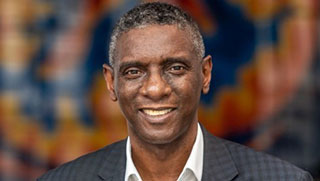
Dr Mark Richards
Director of Outreach in the Imperial Physics Department and Founder of Duvas Technologies Ltd
Mark co-founded Duvas Technologies which sepcialises in wireless environmental monitoring networks. As Director of Outreach at Imperial Physics, he developed STEM engagement schemes for underrepresented youth that have been replicated at other institutions. He is a City & Guilds Fellow.
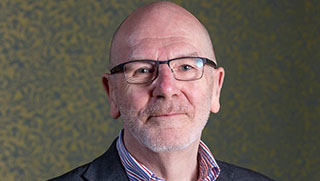
Dick Palmer
Chair of City & Guilds Foundation and Vice-Chair City & Guilds
Dick Palmer has worked in the education and skills sector for over 30 years, as Principal of City College Norwich and currently as a Non-Executive Director in a number of independent training companies. He is passionate about the role of AI in skills development and is a champion for supporting neurodiversity in the workplace. Dick is a Fellow of City & Guilds and Chair of the City and Guilds Foundation.
Frequently asked questions
Who can apply for a grant?
The Transtions Commission accepts EoIs and applications from charities, social enterprises and training providers across the UK that address the following issues:
- Explore innovative new ways to support the mental health and wellbeing of young people as they navigate the transition into FE
- Support FE settings to pilot new approaches to help retain young people with multiple barriers within FE setting
- Evidence the impact of successful interventions and showcase best practice to support Colleges in their budget decisions now and into the future.
It will not support:
- Individuals seeking support for their own learning
- For-profit companies aimed at generating profit for private distribution
- Organisations where observance of a particular faith or belief is a prerequisite for support
- Organisations which exist to promote any political party or are directly aligned with a political party
- Organisations based outside of the UK.
What is the timeline for grant decisions?
We will let applicants know if their Expression of Interest (EOI) is successful by the end of April. Applications will be open in April and May.
Will I need to report back to the City & Guilds Foundation on impact and progression?
The City & Guilds Foundation or our partner will be in touch about impact reporting
How much funding is available?
The fund will consider grants in excess of £50,000.
I have previously applied and been rejected for a grant – can I apply again?
Yes. If your project meets the criteria we are more than happy to consider a new application.
We are already working with City & Guilds in some capacity, can we apply?
Yes, but applicants are asked to declare the nature of their existing relationship with the City & Guilds of London Institute and any of its brands in the Expression of Interest form. The form has a specific section which addresses this point.
Are for-profit companies able to apply?
No, for profit companies are not permitted to apply unless they are jointly applying in partnership with an eligible entity such as a registered UK charity.
Can a charitable foundation linked to a for-profit company apply?
Yes, we will consider applications proposed by the charitable foundations of relevant for-profit companies where a project meets the stated objectives of the fund and meets the criteria.
Is work outside the UK eligible?
No, all proposed projects must be active in the UK.
Must our project be delivered in England?
No, projects across the UK, including Northern Ireland, Wales, Scotland, the Isle of Man, Jersey and Guernsey will be considered. We are especially interested in areas with higher barriers and less access to skills development.
How will my application be assessed?
Your initial Expression of Interest will be reviewed by a panel of experts with extensive experience in grant making and impact measurement. Successful applicants will be contacted and asked to work up their proposal into a detailed submission for further consideration.
How do I apply?
All applicants must complete an initial Expression of Interest from which will include details of the nature and scale of your organisation, any existing relationship with the City & Guilds of London Institute and a broad sketch of your proposed grogramme. This on-line form has been designed to allow interested parties to share an initial picture of their proposal without the need for a time-consuming detailed submission at the first stage.
Can I apply by post or fax?
No, all expressions of interest must be submitted through the online form.
Will I receive a receipt for my submission?
Yes, all applicants will receive an automated response to acknowledge receipt of their Expression of Interest.
Will applicants receive feedback if they are not selected through the next stage?
Due to the volume of applications, the City & Guilds Foundation is not able to provide feedback to individual applicants. Unsuccessful applicants will be informed via email.
If our project is selected, what are the next steps?
Successful applicants will be contacted directly and asked to complete a detailed submission. This would request granular detail about the proposed project, the schedule of work, detailed budget and timeline.
Why do you have a two-stage application process?
The process has been designed to help save applicants time through initial screening to ensure relevant projects are invited to develop a more in-depth stage 2 application. This is intended to help ensure only eligible organisations are invited to stage 2 and overall the process is as efficient as possible. Note – being invited to make a second stage application does not necessarily mean your organisation will gain funding.
How do I register?
- Go to the City & Guilds Foundation Applications and Nominations Platform
- Click Register
- Choose to register to SurveyMonkey Apply (recommended) or using a Social Media Account (this will redirect you to the social media platform to complete your registration)
- Click Create Account
- You will then receive an email asking to verify your account, click Confirm email address within this email
How do I reset my Password?
- Go to the City & Guilds Foundation Applications and Nominations Platform
- Click Log In
- Underneath the Email/Password fields, click “Forgot your password?“
- Enter the email address that you use to login to the site
- Click Send Instructions
- You will be sent instructions to the email you entered to reset your password. If you aren’t to locate the email in your inbox, we recommend checking your Spam/Junk folder
- Click on the link within the email
- Enter a new password and confirm the password
- Click Reset Password
Why am I not receiving any emails from the site?
- Ensure that noreply@mail.smapply.net is added to your safe sender list within your email account.
- Ensure that your email is verified within the site. If you’re receiving this notification at the top of your page, then it’s possible that you won’t receive other emails from the site.
- Ensure that you’re subscribed to receive emails from the site.
- Check your Spam Folder to verify whether the email was sent to your Spam/Junk folder.
- Depending on the email(s) you’re expecting to receive, reach out to the administrators to ensure that an email was sent out.
How do I create a new application?
- Click View Programmes
- Find Community Skills Fund (note that at certain times of the year, other programmes will show here) and select MORE >
- Click Apply
The City & Guilds Foundation reserves the right to exclude any application that it deems outside its criteria. Funding will be subject to The City and Guilds of London Institute’s discretion and the successful applicant entering into a separate contract with The City and Guilds of London Institute on completion of the application and due diligence process.
City & Guilds Foundation’s Rights
The City & Guilds Foundation reserves the right to:
- waive or change the requirements of the Community Skills Fund from time to time without prior notice;
- withdraw the Community Skills Fund at any time, or re-invite applications on the same or any alternative basis; and
- choose not to award funding as a result of the application process.
Applicant costs
The City & Guilds Foundation will not in any circumstances be liable for any costs, expenditure, work or effort incurred by an applicant in applying to the Community Skills Fund.
Data Protection
The personal data of applicants (and any other personal data contained in an application) will be managed by City & Guilds in accordance with the General Data Protection Regulation and Data Protection Act 2018. City & Guilds will collect personal data at the time of submission of each application, and as is otherwise necessary in order to administer the Community Skills Fund and all associated activities. By submitting an Expression of Interest you agree that any personal data provided by you to the City & Guilds Foundation may be held and used by the City & Guilds Foundation and its agents to administer the Community Skills Fund. Applicants may contact the City & Guilds Foundation at any time to update their details and/or preferences regarding the use of personal data.
Liability
While the information contained on this website is believed to be correct at the time of issue, City & Guilds and the City & Guilds Foundation accepts no liability in any circumstances for its accuracy, adequacy or completeness, nor is any express or implied warranty given. No representations or warranties are made in relation to these statements, opinions or conclusions.
Insofar as is permitted by law, City & Guilds and its agents accept no responsibility for any damage, loss, liabilities, injury or disappointment incurred or suffered as a result of submitting an application to the Fund.
The City and Guilds Institute of London is a registered charity in England and Wales (312832).